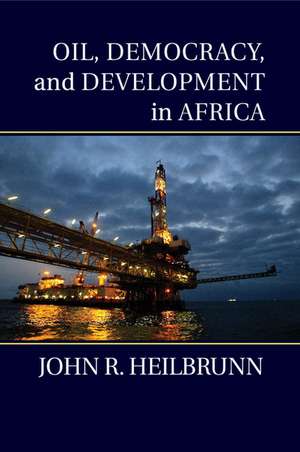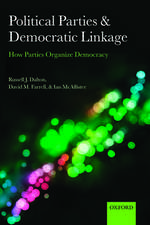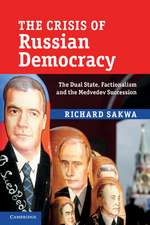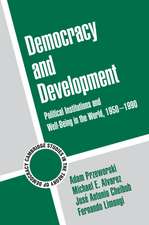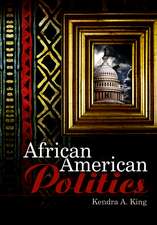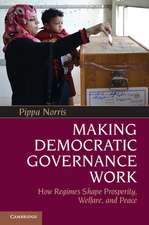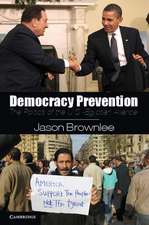Oil, Democracy, and Development in Africa
Autor John R. Heilbrunnen Limba Engleză Paperback – 15 mar 2017
| Toate formatele și edițiile | Preț | Express |
|---|---|---|
| Paperback (1) | 286.30 lei 6-8 săpt. | |
| Cambridge University Press – 15 mar 2017 | 286.30 lei 6-8 săpt. | |
| Hardback (1) | 504.40 lei 6-8 săpt. | |
| Cambridge University Press – 20 apr 2014 | 504.40 lei 6-8 săpt. |
Preț: 286.30 lei
Nou
Puncte Express: 429
Preț estimativ în valută:
54.79€ • 57.46$ • 45.61£
54.79€ • 57.46$ • 45.61£
Carte tipărită la comandă
Livrare economică 01-15 aprilie
Preluare comenzi: 021 569.72.76
Specificații
ISBN-13: 9781107661073
ISBN-10: 1107661072
Pagini: 282
Ilustrații: 13 tables
Dimensiuni: 153 x 230 x 18 mm
Greutate: 0.42 kg
Editura: Cambridge University Press
Colecția Cambridge University Press
Locul publicării:New York, United States
ISBN-10: 1107661072
Pagini: 282
Ilustrații: 13 tables
Dimensiuni: 153 x 230 x 18 mm
Greutate: 0.42 kg
Editura: Cambridge University Press
Colecția Cambridge University Press
Locul publicării:New York, United States
Cuprins
1. Oil, democracy, and development in Africa; 2. Historic paths: colonialism and its legacies; 3. Oil companies: corporate strategies and profits; 4. Economic growth and phases of production; 5. Resource revenues, corruption, and contracts; 6. Machine politics, oil, and democracy; 7. Conclusion: oil, democracy, and development in Africa.
Recenzii
'Through a close and detailed examination of the political management of oil resources in sub-Saharan Africa, John R. Heilbrunn has shed new and surprising light on the natural resource curse. After properly discounting for the historical and economic circumstances that confront petrostates in the years before they discovered oil, he finds little evidence of a curse. On the contrary, he carefully documents the emergence of internal political pressures and the evolution of industry-state relations that lead even the most recalcitrant autocrats to share oil rents with the broader population. This is a fascinating book that should be welcomed by students of both African politics and the natural resource curse.' Philip Keefer, Lead Economist, Development Research Group, The World Bank
'While sum of all its parts makes this book a great read, Heilbrunn's take on resource revenues, corruption and contracts in latter stages of the narrative should strike a chord with most readers … The Oilholic would be happy to recommend it to fellow analysts, those interested in the oil and gas business, African development, politics and the resource curse hypothesis.' Gaurav Sharma, Oilholics Synonymous Report (oilholicssynonymous.com)
'The arguments made in this book present a robust challenge to the idea of the resource curse and provide a comprehensive survey of the ways in which natural resources can potentially facilitate the emergence of democracy … This book will be of interest to a broad range of readers considering the potential impact of natural resource holdings on democratisation and governance in developing states.' Thomas O'Brien, Commonwealth and Comparative Politics
'While sum of all its parts makes this book a great read, Heilbrunn's take on resource revenues, corruption and contracts in latter stages of the narrative should strike a chord with most readers … The Oilholic would be happy to recommend it to fellow analysts, those interested in the oil and gas business, African development, politics and the resource curse hypothesis.' Gaurav Sharma, Oilholics Synonymous Report (oilholicssynonymous.com)
'The arguments made in this book present a robust challenge to the idea of the resource curse and provide a comprehensive survey of the ways in which natural resources can potentially facilitate the emergence of democracy … This book will be of interest to a broad range of readers considering the potential impact of natural resource holdings on democratisation and governance in developing states.' Thomas O'Brien, Commonwealth and Comparative Politics
Notă biografică
Descriere
This book focuses on the history, key industry and policy actors, and political economic outcomes in oil-producing African states.
